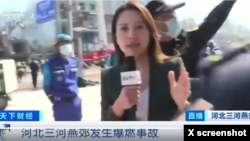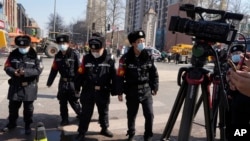Chinese reporters, often thought of as mouthpieces for Beijing, appeared to be pushed out of that role Wednesday when authorities physically intervened while several state media reporters were gathering news or doing live coverage from the scene of a deadly blast in Hebei province.
The actions of local authorities triggered a quick response from the All-China Journalists Association, which issued a statement defending the role of journalists acting in their professional manner in Chinese society.
The death toll from the blast that hollowed out a four-story building has risen to seven, according to state media reports, with dozens more injured.
Local authorities told Chinese media on Thursday that the blast was caused by underground gas pipe leaks, not business entities that were housed in the building, as previously reported.
Chinese reporters from multiple media outlets rushed to the scene within hours of the explosion, among them reporters from China Central Television, a key player in China’s state media conglomerate, along with People’s Daily and Xinhua.
During CCTV Channel 2’s midday broadcast Wednesday, while two Beijing anchors questioned the station’s reporter on the scene live, viewers saw men, dressed in black, approach the reporter and block the camera. The reporter was cut off midsentence, causing the two anchors sitting in their studio in Beijing to say “be safe,” before turning to “other news.”
In another incident from the blast scene, a team of reporters from another CCTV department, wearing media vests, were grabbed by about a dozen security officers before they were marched away, as seen in a video clip posted online by one of the reporters.
The two incidents prompted the All-China Journalists Association to issue a statement Wednesday evening on WeChat. It briefly recounted the incidents, then raised and answered three questions.
“Should journalists be out reporting?” the association asked. It answered yes, adding, “The public wants to know more about this grave and significant public safety incident.”
It then asked whether reporters on the scene were causing trouble, to which it said no, adding that safeguarding the public’s right to know is part of journalists’ job. It also highlighted the CCTV teams’ professionalism on the scene.
Finally, the association asked whether an official press release or its equivalent could replace reporting, to which the association answered no.
“In the absence of trained reporters filing from the scene, the pubic is left with two sources of information,” the association said.
“One is through official statements; the second is various information spread on the internet. However, an official statement won’t cover the details, while information spread on the internet could potentially spread rumors. Hence the role of professional media is critical.”
The association concluded its statement by saying authorities should not crudely interfere or interrupt journalists at work.
Members of China’s state media rarely are seen being physically harassed by authorities, especially not on live television. Even more rare is for a national trade association, in this case one representing China’s own journalists, to come out in defense of their members’ right to work and to be treated with respect.
As Thursday began, a little more than 24 hours after Wednesday's deadly blast, the incident and associated developments was the number one searched topic on China’s social media platform Weibo, clocking in 440 million views, a third of China’s 1.4 billion population. By Thursday evening, however, the topic was nowhere to be seen among the top 10 “hot search” topics on Weibo.
Many commentators on Weibo expressed support for the reporters and pointed to law enforcement figures’ actions as an example of the unchecked power wielded by multiple layers of the one-party state.
When Hebei local authorities explained that the CCTV reporters’ live feed was interrupted out of “safety concerns,” one Weibo user responded: “The real threat to our safety is the violation of the public’s right to know and journalists’ right to do their job.”
On Thursday, a statement was posted by the “command center in charge of the blast and fire incident,” acknowledging mishandling of the situation in which reporters were “forced to leave the scene.”
“Looks like the authorities’ weiwen techniques were used on state media representatives, how ironic,” noted a Chinese commentator on Twitter/X.
Weiwen is the term the government uses to describe efforts to maintain social stability. It is widely seen at home and abroad as the government’s means to suppress dissent, or potential dissent, often violently.





